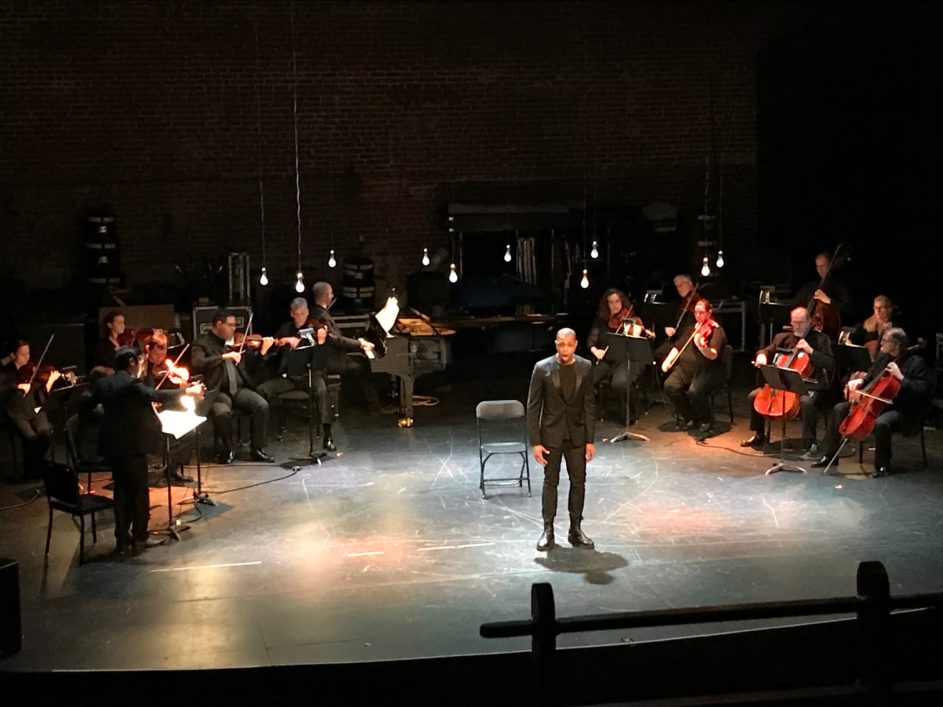Just before the 2018 Big Ears Festival began, an acquaintance commented on “the weird music” at the coming weekend’s event. I didn’t have a chance to follow up, but my guess is that person has never been to Big Ears.
The term “big ears” actually means having an interest in a wide-range of musical forms and types. One certainly finds that at Big Ears. I’ve been to every festival but one and very rarely found anything I would classify as weird.
What one won’t hear at Big Ears is anything that resembles commercial music. What one does hear is the range of individual expressions of the spirit. No other festival does it as well as Big Ears. People come from around the world to experience it.
One of the most moving experiences this year was baritone Davóne Tines and the Knoxville Symphony strings performance at the Bijou Theatre of “Were You There,” a work that uses portions of the spiritual of that name and 11 bare light bulbs. Each represented the life of a young black person whose light had gone out too soon, extinguished by violence.
At the Mill and Mine Sunday afternoon, composer Julia Wolfe conducted the Bang on A Can All-Stars and the Nashville-based choir Sonus in a performance of her Pulitzer Prize-winning oratorio, “Anthracite Fields,” a choral work about coal mining in Wolfe’s native Pennsylvania. Projected images of mining and data about the mining process accompanied the presentation.
At the Knoxville Museum of Art, there was more singing. This time, traditional Old Harp, shape-note singing led by folk musician Sam Amidon, with the audience invited to sing along.
High-level musicians are attracted to the opportunity for spontaneous performances with other musicians they don’t otherwise get the chance to hear, much less perform together.
At Church Street United Methodist Church on Saturday afternoon, bluegrass banjo master Bela Fleck played with the avant garde string quartet, Brooklyn Rider. First violinist Colin Jacobsen’s string quartet, “Brooklesca,” sounded like Fleck’s banjo part had been written in, even though Fleck was improvising his way through the music.
As Fleck and Abigail Washburn, who seemed to be everywhere, later performed at the Tennessee Theatre, Brooklyn Rider came on stage to play some of Fleck’s bluegrass music.
At the Bijou Theatre Saturday evening, jazz pianist Milford Graves and legendary jazz drummer Jason Moran performed together for the very first time. The line to get into their show stretched around the corner most of the way westward toward the post office.
Sunday afternoon at the Bijou Theatre, Washburn, who plays folk and bluegrass banjo, was joined by Wu Fei, classically trained as a pipa and guzheng master on Chinese string instruments. The line to get into their concert again stretched around the corner and completely to the post office.
There were also extraordinary performances by specific groups and solo performances.
At the Bijou, jazz violinist Jenny Scheinman, banjo player Robbie Fulks and Robbie Gjersoe, who plays resonator guitar, played Scheinman’s music written to accompany film clips of Kannapolis, N.C., shot in the 1930s and 1940s.
Sitar virtuoso Anoushka Shankar, daughter of the great Indian sitar master Ravi Shankar, along with drummer Mamu Delago, bassist Tom Thumb and reed player Snjeev Shankar (no relation) played music from their album, “Land of Gold,” a powerful work about immigration.
Sunday afternoon at Mill and Mine, the Knoxville-based experimental collective, Nief-Norf, a contemporary performance group under the leadership of Andrew Bliss, performed Steve Reich’s minimalist masterpiece, “Quartet.”
If there was a concert I heard that might have edged toward what might be considered at least a little weird, it was Diamanda Galás, late Saturday night at the Tennessee Theatre. Galás doesn’t sing. She sits at the piano, building a musical framework. Then she opens an airway to her soul and one of a dozen or so voices, ranging from a coarse growl to a high wail to a death rattle emerges, depending on the subject of her music. At moments it was so personal, it was like eavesdropping to listen to it. But whatever the sound, it’s wordless music that demands you turn yourself over to it and soak it in.
Collectively, this is just a sampling of the more than 100 performances, plus spontaneous gatherings, that made up this year’s Big Ears.

Bela Fleck and Abigail Washburn at Tennessee Theatre

Jazz pianist Milford Graves and legendary jazz drummer Jason Moran played together for the first time at the Bijou Theatre

Sitar master Anoushka Shankar, drummer Mamu Delago, bassist Tom Thumb and reed player Snjeev Shankar at Tennessee Theatre

Diamanda Galás at Tennessee Theatre

